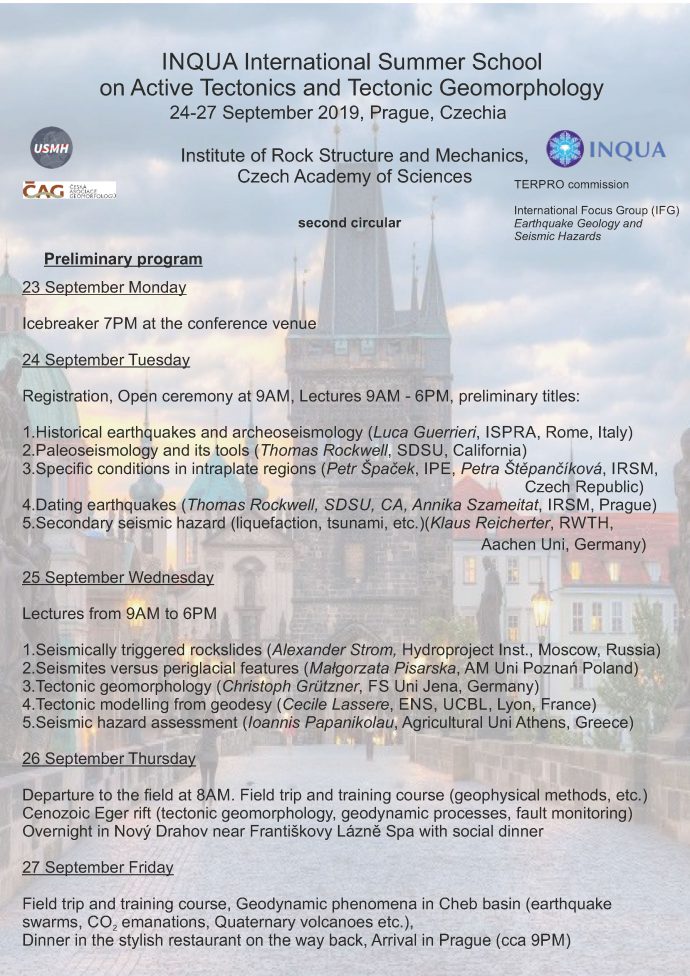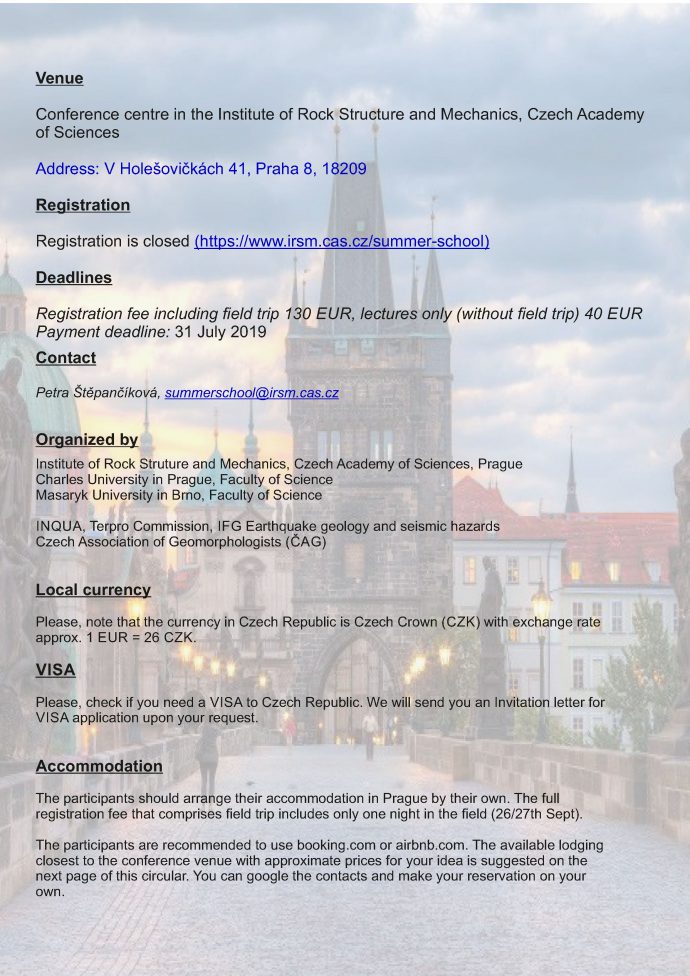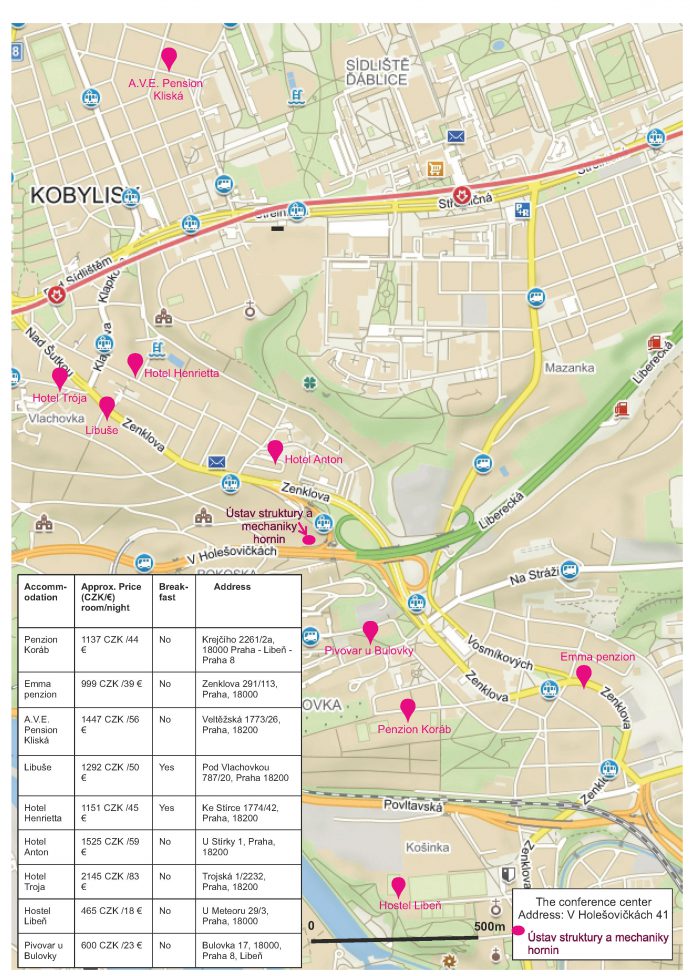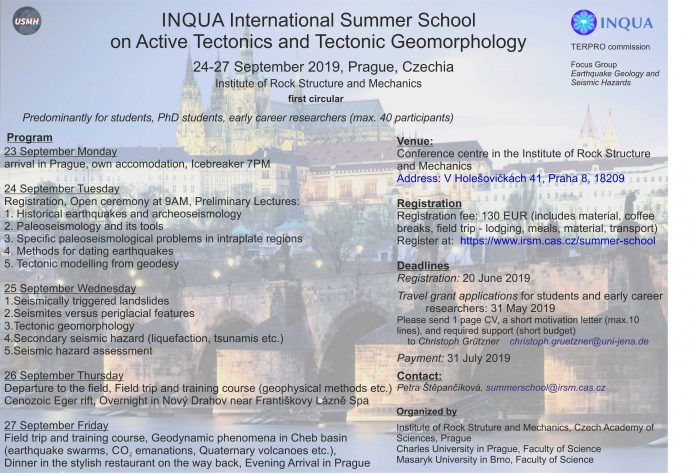On 18 December we held a short virtual PATA meeting, since the in-person meeting to be held in Chile had to be postponed to 2021. The PATA Days (Paleoseismology, Active Tectonics, Archaeoseismology) are the main event of INQUA TERPRO‘s earthquake science community, led by the project TPPT (Terrestrial Processes Perturbed by Tectonics). Most of us are starving for joint field trips and personal contacts, but it was nice to at least see everyone online – more than 170 people attended the 1.5 hrs event. The five main topics were:
morePosts in the category » PATA days « ( 159 Posts )
-
This was the virtual PATA short meeting 2020
-
How to access the PATADays virtual meeting, Dec. 18, 2020
2020-12-17 | in PATA daysWhile the real PATA Days in Chile have been postponed to 2021, we will run a short virtual meeting on Dec 18, 2020 in order to keep the spirit alive. Here’s how to take part:
more -
Announcement: PATA Days Webinar on 18 Dec, 2020
2020-11-26 | in PATA daysThe 2020 PATA Days in Chile, originally planned for November this year, had to be postponed to November 2021. Let’s keep the enthusiasm for the realization of this nice congress in the coastal Atacama Desert of northern Chile! On 18 December, 2020 there will be a webinar including lectures on paleoseismology and seismic hazard, as well as an introduction to recent advances in active tectonics along the major northern Chile seismic gap. In addition, the first short-abstract volume in digital version will be released.
more -
PATA Days in Chile 2020: registration & short abstracts due 28 February!
2020-02-13 | in PATA daysDear colleagues,
Please make sure to register for the 2020 PATA Days in Chile before 28 February here: https://www.patadayschile.cl
You can also book your hotels here and submit the short abstracts. There’s only a limited number of places due to the remote venue in a wonderful resort hotel – first come, first served. The PATA Days (Paleoseismology, Active Tectonics, Archaeoseismology) is the largest int’l meeting for the paleoseismology community and supported by INQUA. In Chile, a lot of tsunami science will of course also happen.
-
PATA Days 2020 in Chile – new deadlines
2019-12-05 | in PATA daysThese are the updated deadlines for the upcoming PATA Days in Chile, November 2020:
- Short abstract submission (300 words): 28 February, 2020
- Extended abstract (four pages as usual): 30 March, 2020
- Initial registration: 28 February, 2020
- Final registration: 30 March, 2020
The website with all the relevant information is here: https://www.patadayschile.cl/.
Here’s the updated 1st circular with the new deadlines (PDF):
-
This was the INQUA Summer School on Active Tectonics and Tectonic Geomorphology in Prague
The INQUA Summer School on Active Tectonics and Tectonic Geomorphology was held in Prague from 24-27 September, 2019. This summer school was run by INQUA‘s IFG EGSHaz as part of the TERPRO commission. The event was hosted by the Institute of Rock Structure and Mechanics, Academy of Sciences of the Czech Republic, Dpt. Neotectonics and Thermochronology. Main organizer was IFG co-leader Petra Štěpančíková. We would also like to thank MSc. Jakub Stemberk, Monika Hladká, Jana Šreinová, the deputy director Dr. Filip Hartvich, and all the staff involved for their professionalism and warm hospitality. Overall, 50 participants and 14 lecturers from 25 countries participated in the summer school.
more -
INQUA Summer School on Active tectonics in Prague, second circular
The second circular for the Summer School on Active tetonics in Prague, 24-27 September, 2019, is out now. Download here. We are sorry that the summer school is already fully booked. See you in Prague in September!
The event organised by the Institute of Rock Structure and Mechanics (Czech Academy of Sciences), Charles University in Prague (Faculty of Science), Masaryk University in Brno, and INQUA’s IFG EGSHaz. We are supported by, and work in the framework of, INQUA – the International Union for Quaternary Research, and the Czech Association of Geomorphologists (CAG) as a contributor and member of IAG.



-
Registration now open for the INQUA Int’l Summer School on Tectonics & Tectonic Geomorphology, 24-27 Sep, 2019, Prague
Register here for the INQUA International Summer School on Tectonics and Tectonic
Geomorphology, 24-27 Sep 2019, Prague:https://www.irsm.cas.cz/summer-school/
ECR & DCR travel grants are also available! Note that no accommodation will be organised in Prague, but one night is included during the field trip.
-
1st circular: INQUA Int’l Summer School on Active Tectonics & Tectonic Geomorphology in Prague, 24-27 September 2019
The INQUA Focus Group on Earthquake Geology and Seismic Hazards (EGSHaz) will run the International Summer School on Active Tectonics and Tectonic Geomorphology in Prague from 24-27 September, 2019. This event replaces the PATA Days this year and aims mainly at MSc./PhD students and Early Career Researchers. Please note that this is not a classical PATA Days event where new science will be shown and discussed. The summer school is organized by the Institute of Rock Structure and Mechanics, Czech Academy of Sciences and the Charles University in Prague, Faculty of Science. Please find a pdf of the first circular here.

-
PATA Days 2019 in Israel cancelled
The 10th PATA Days, which were planned for September 2019 in Israel, have to be cancelled. The next regular PATA meeting will therefore be held in Chile 2020. This is the bad news. The good news is that there will be a student summer school organized by the IFG EGSHaz from 24-27 September, 2019, in Prague (Czech Republic). Petra Štěpančíková and her team are currently working on the schedule. The summer school will mainly address students and PhD students interested in earthquake geology, paleoseismology, and tectonic geomorphology. We will likely have two days of lectures & exercises and two days of field trips. More information will be available soon, so stay tuned.
Please make sure to consider attending the INQUA Congress in Dublin (25-31 July, 2019). There will be three sessions organized by our IFG:
- Earthquake Geology and Seismic Hazards: from earthquake mapping of historical and prehistoric earthquakes to paleoseismology (Ioannis Papanikolaou, Stéphane Baize, Christoph Grützner)
- Paleoseismology of plate interiors under Pleistocene climate changes (Klaus Reicherter, Petra Štěpančíková, Małgorzata Pisarska-Jamroży)
- Development of soft-sediment deformation structures (SSDS) and differences between non-seismic and seismic structures (Małgorzata
(Gosia) Pisarska-Jamroży, A.J. Tom van Loon, Barbara Woronko, Andreas Börner)
Also, this session could be of interest:
- Subduction zone palaeoseismology (Emma Hocking, Ed Garrett, Jasper Moernaut)
See you in Dublin and Prague!
Ioannis, Petra, Christoph
